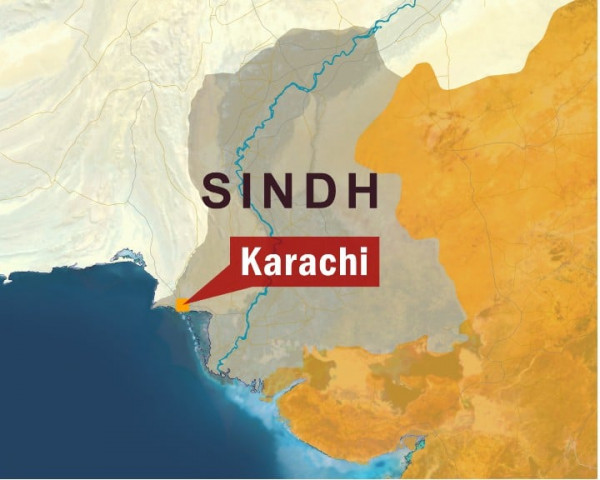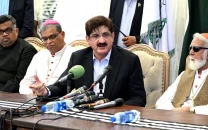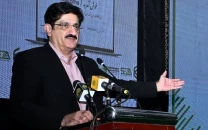Lahore College Women University takes home 1st prize for anti-graft competition
Six teams from across the country nominated for documentaries.

“How are we to live if we fail to ask ourselves how it is we will die?”Javed Ansari, the dean of the College of Business Management (CBM), tossed this thought-provoking question to an audience of over 70 gathered at the CBM business auditorium.
His question was not meant to send the crowd into a contemplation on life and death, it was in reference to taking responsibility for one’s actions, part of a documentary competition on anti-corruption organised by Transparency International.
“Violation of the spirit of the law undermines systematic norms,” he concluded. “The root cause of corruption, its sole motivator, must be recognised and understood in order to carry out an anti-corruption movement.” Six teams from universities across the country were nominated from a total of 15.
They presented documentaries produced after months of research and extensive reporting before the audience and judges.
The country’s budding scholars believe that there is a solution to corruption and that social awareness paired with bold confrontation is the first step.
Fatima Jaffery felt that three people are integral to this process. “A father, mother and teacher can contribute infinitely towards the reduction of corruption by establishing strong morals and values within homes and schools.”
Mohammed Mazhar Aziz, Usman Ahmad and Zahid Danial from Bahauddin Zakaria University in Multan kicked things off with clips depicting the struggle of lower-income groups within the country.
They spoke of rigged weight-scales used by fruit vendors and butchers and milkmen who mix water with their milk.
The compilation faded out as the national anthem blared through the auditorium’s worn-out speakers in a final attempt to stir some form of patriotism within the crowd. Students of the Hyderabad Institute of Arts, Science and Technology focused on corrupt policemen - Rs50 can be the difference between being pegged with a false accusation and being let off with a warning.
Interestingly, the Hyderabadi trio, Pardeep Kumar, Shahmir Hasan, Khan Mohammed and Hassan Bin Sami, highlighted pollution as a form of corruption as well. “There is so much pollution in our country that if it were not for our lungs we would have nowhere to keep it,” said the documentary’s final warning.
IBA’s Rumana Husain, Rozario Fernandes, Yasir Farooqui and Aizaz Imtiaz built on the theme of self-judgment and contradicted the famous saying that ‘power corrupts, absolute power corrupts absolutely’. “People are all corrupt,” they observed glumly, “Power is what brings it out.”
Inspired by Quaid-e-Azam’s vision of his country, the Institute of Management Sciences in Peshawar’s Naveed Syed, Mohammed Zeeshan and Afraz Abdur Rehman spoke about how merit is no longer rewarded.
They felt credit is not given where it is due and poverty in rural areas and a lack of accountability were the two influential factors in the growth of corruption.
Waqas Zia, Muhammad Faraz, Agha Sadaf Mehdi and Muhammed Zunair of the Islamia University of Bahawalpur appealed to the patriots in the crowd by showing an encouraging clip of news anchors putting politicians on the spot with incisive questions.
A moving clip of children declaring what they wanted to be when they were older was screened shortly after. “I want to be a doctor so that I can heal the wounded,” said one.
“I want to be an engineer so that I can rebuild my country and help solve electricity problems,” announced another. Their optimistic innocence was part of the crew’s message.
The Lahore College Women University’s speeches on the energy sector closed the session and won them the first prize of Rs25,000. “We have taken a more creative stance without a documentary for a visual aspect,” explained Fatima Jafri.
She told the audience that Pakistan had been ranked 34th among the most corrupt countries in 2010. In the last 10 months, over 30,000 cases of electricity theft were recorded via FIRs lodged at police stations.
“The easiest targets of corruption are the poor as they are easily intimidated.”
As the audience filed out, it was clear that the documentaries had moved them.
“The future of Pakistan may seem bleak to some, but it is the hard work and persistence of the youth that will ultimately make a difference,” claimed one of the spectators.
Fifteen thousand rupees were given to the runner-up, Islamia University of Bahawalpur, and a prize of Rs10,000 was given to Institute of Management Sciences for third place.
Published in The Express Tribune, August 1st, 2011.



















COMMENTS
Comments are moderated and generally will be posted if they are on-topic and not abusive.
For more information, please see our Comments FAQ